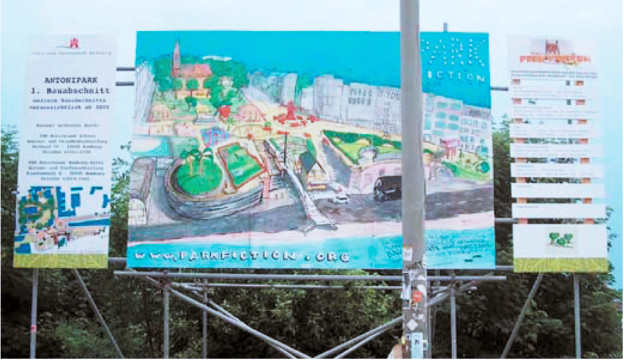Since 1995 Park Fiction has organized COLLECTIVE PRODUCTIONS OF DESIRE for a park in St. Pauli, Hamburg, Germany’s red light district. The physical location of the park is scenic, with views looking over the harbor, and the city government has been eager to sell the site to private real-estate developers. These plans, developed by private investors working with government officials, were blocked by a network of community members organized by Park Fiction. Rather than simply protest the planned gentrification of the park area, this loose network organized a parallel planning process, creating platforms for exchange among people from many different cultural fields: musicians, priests, a headmistress, a cook, café-owners, bar-men, a psychologist, squatters, artists and interventionist residents. This “constituent practice” was accompanied by a series of lectures, talks, discussions, exhibitions and screenings that Park Fiction termed “Infotainment,” and by other activities anticipating the desired park. Located in one of the poorest residential areas in western Germany, Park Fiction is an internationally-discussed art project that approaches the planning process like a game.
Park Fiction developed special tools and techniques to make the planning process more accessible. Margit Czenki produced her film Park Fiction—Desire will Leave the House and Take to the Streets in 1998, to capture the different voices of the park, and the moment when “art and politics made each other more clever.” The park is still under construction. The Teagarden Island features artificial palm trees and is surrounded by an elegant 40 meter long bench from Barcelona. There is an Open Air Solarium and a Flying Carpet, a wave-shaped piece of lawn surrounded by a mosaic inspired by the Alhambra. The Woman Pirates Fountain and the strawberry- shaped Tree House, however, have not yet been financed. To keep the planning horizon open Park Fiction will soon initiate the Institute for Independent Urbanism.
A condensed version of the Park Fiction installation developed by Margit Czenki, Günter Greis and Christoph Schäfer for Documenta 11 in 2002, has been placed in Park Fiction’s former “planning container.” This archive- like space offers visitor’s insights into self-organizing social movements. It’s design combines references to Russian Constructivism with the style of a 1960s language lab, referencing the failed promises of past revolutionary moments. Rather than a passive storage system, the archive functions as a space of discussion and reflection in which new local, national and international projects located at the intersection of the everyday and the imaginary can be incubated. To catalyze this process Park Fiction organized an “international congress” in 2003, featuring groups from Delhi, Tijuana, La Plata, Hamburg and Milan, that all manage to create “Unlikely Encounters in Urban Space.” After years of struggle, the first section of the park is now being used by the public.

